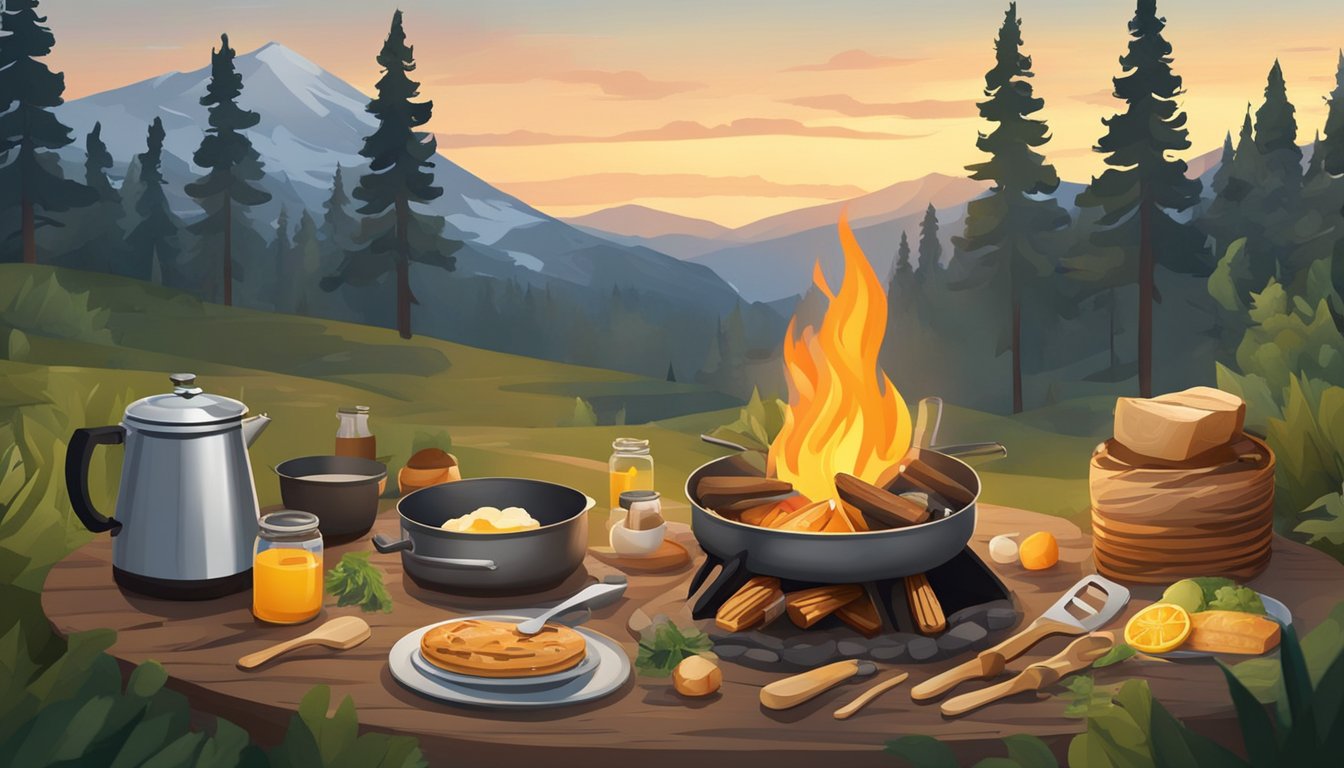Camping adventures offer a unique opportunity to connect with nature and enjoy the great outdoors. While roughing it in the wilderness, starting the day with a satisfying breakfast can set the tone for an exciting day of exploration and activities. These 15 breakfast recipes are specifically designed to be easy, delicious, and practical for camping environments.
From simple no-cook options to hearty cooked meals that can be prepared over a campfire or portable stove, these breakfast ideas cater to various tastes and dietary preferences. They incorporate ingredients that are easy to pack, store, and prepare in a campsite setting. Whether you’re an experienced camper or new to outdoor cooking, these recipes aim to make your morning meal both enjoyable and hassle-free.
1) Campfire Breakfast Burritos
Campfire breakfast burritos are a hearty and convenient meal for outdoor enthusiasts. These portable bundles can be prepared in advance or cooked fresh at the campsite.
To make them, start by cooking bacon or sausage in a skillet. Next, sauté vegetables like bell peppers and onions in the same pan.
Scramble eggs with the cooked meat and vegetables, adding salt and pepper to taste. Some recipes include hash browns for extra substance.
Once the filling is ready, spoon it onto warm tortillas. Add shredded cheese and optional ingredients like green chiles or cilantro.
Roll the tortillas tightly, tucking in the ends to secure the filling. Wrap each burrito in foil for easy transport and reheating.
At the campsite, place the foil-wrapped burritos near the campfire or on a grill to warm them through. Unwrap and enjoy a satisfying breakfast in the great outdoors.
2) French Toast Skewers

French toast skewers offer a fun twist on the classic breakfast dish, perfect for camping adventures. This portable version allows campers to enjoy their favorite morning treat with ease.
To prepare, cut thick slices of bread into cubes and thread them onto skewers. Dip the bread-laden skewers into a mixture of beaten eggs, milk, cinnamon, and vanilla.
Cook the skewers over a campfire grill or portable stove, turning occasionally until golden brown on all sides. The result is a deliciously crispy exterior with a soft, custardy interior.
For added flavor and nutrition, alternate bread cubes with fresh fruit pieces like strawberries or peaches on the skewers. This creates a balanced and colorful breakfast option.
Serve the French toast skewers with a side of maple syrup for dipping. Campers can eat them directly off the skewers, eliminating the need for plates and utensils.
This recipe is not only tasty but also efficient for outdoor cooking. It minimizes mess and cleanup, making it an ideal choice for camping breakfasts.
3) One-Pan Breakfast Hash

A one-pan breakfast hash is an ideal camping meal. This versatile dish combines crispy potatoes, savory meats, and fresh vegetables in a single skillet.
Start by cooking diced potatoes in a hot pan with oil until golden. Add chopped onions and bell peppers for flavor and color. Once the vegetables are tender, toss in pre-cooked sausage or bacon for extra protein.
Create wells in the hash mixture and crack eggs directly into them. Cover the pan and let the eggs cook to desired doneness. The result is a hearty, satisfying breakfast that requires minimal cleanup.
Customize the hash with ingredients like mushrooms, spinach, or cheese. For a vegetarian option, swap meat for beans or tofu. Season with salt, pepper, and herbs like rosemary or thyme for added depth.
This camping-friendly recipe is quick to prepare and easy to adapt based on available ingredients. It’s a filling meal that provides energy for a day of outdoor activities.
4) Overnight Oats in a Jar

Overnight oats in a jar are an ideal camping breakfast. This no-cook meal is prepared the night before, allowing campers to wake up to a ready-to-eat, nutritious breakfast.
To make overnight oats, combine rolled oats with milk or a plant-based alternative in a jar. Add yogurt for extra creaminess and protein. Sweeteners like honey or maple syrup can be included to taste.
Customize the oats with various mix-ins. Fresh or dried fruits, nuts, seeds, and spices all work well. Popular combinations include blueberry pie, cinnamon roll, and peanut butter banana.
For camping, prepare the oats in a sealed jar or container before leaving home. Store in a cooler until ready to eat. In the morning, give the oats a quick stir and enjoy straight from the container.
This versatile breakfast can be eaten cold or warmed up over a campfire. It provides lasting energy for outdoor activities and requires minimal cleanup, making it perfect for camping trips.
5) Campfire Cinnamon Rolls
Campfire cinnamon rolls bring the comfort of home-baked treats to the great outdoors. These sweet, gooey delights can be prepared using various methods, making them adaptable to different camping setups.
One popular technique involves using a Dutch oven. Line the oven with parchment paper, arrange the cinnamon rolls inside, and cook over the campfire or charcoal for 10-15 minutes. The result is perfectly baked rolls with a crisp exterior and soft interior.
For a simpler approach, wrap individual crescent rolls around skewers and coat them in cinnamon sugar. Roast these over the campfire for about 5 minutes, rotating frequently to ensure even cooking.
Pre-made cinnamon roll dough works well for camping, but adventurous campers can make dough from scratch. Mix flour, salt, and baking soda, then cut in cold butter and add buttermilk to form the dough.
A drizzle of simple glaze made from powdered sugar and water can add an extra touch of sweetness. This optional finishing touch transforms these campfire treats into a truly indulgent breakfast experience.
6) Vegetable Omelette in a Bag

Vegetable omelettes in a bag are a convenient and mess-free breakfast option for camping trips. This method involves cooking eggs and vegetables directly in a resealable plastic bag.
To prepare, crack eggs into a freezer-safe bag and add chopped vegetables of choice. Popular options include bell peppers, onions, and tomatoes. Season with salt and pepper to taste.
Seal the bag, removing excess air, and shake vigorously to mix the ingredients thoroughly. Place the bag in a pot of boiling water and cook for approximately 13-15 minutes.
Cooking times may vary depending on elevation and the number of eggs used. It’s important to check the omelette periodically to ensure it’s fully cooked.
Once done, carefully remove the bag using tongs or a large strainer. Open the bag and roll the omelette onto a plate for serving.
This method allows campers to enjoy a hot, protein-rich breakfast without the need for multiple cooking utensils or extensive cleanup. It’s also customizable, allowing each person to create their preferred vegetable combination.
7) Dutch Oven Pancakes
Dutch oven pancakes are a delightful camping breakfast option. These fluffy, golden discs can be easily prepared over a campfire or portable stove.
To make them, mix flour, baking powder, salt, sugar, eggs, milk, and melted butter in a bowl. Preheat the Dutch oven by placing it over hot coals or on a stove.
Grease the interior of the Dutch oven with butter or oil. Pour the batter into the heated oven, cover with the lid, and cook for about 15-20 minutes.
For extra flavor, add berries, chocolate chips, or nuts to the batter before cooking. Once cooked, the pancake will be puffed up and golden brown.
Serve the Dutch oven pancake hot, cut into wedges. Top with maple syrup, fresh fruit, or powdered sugar for a satisfying camping breakfast.
This recipe is versatile and can be adapted to serve various group sizes. It’s a great way to start a day of outdoor activities.
8) Granola and Yogurt Parfait

Granola and yogurt parfaits offer a delightful and nutritious breakfast option for campers. This easy-to-prepare dish combines creamy yogurt with crunchy granola and fresh fruits.
To create parfaits at the campsite, campers can layer yogurt, granola, and berries in clear cups or bowls. Alternating these ingredients creates an visually appealing breakfast that’s also satisfying to eat.
For a make-ahead version, campers can prepare the granola at home before the trip. This homemade granola can be stored in airtight containers and used throughout the camping adventure.
Freeze-dried yogurt is another convenient option for backpackers. By blending freeze-dried yogurt with cold water at the campsite, campers can enjoy a fresh parfait without the need for refrigeration.
Parfaits are customizable, allowing campers to add their favorite fruits or nuts. Popular choices include strawberries, blueberries, and sliced bananas.
This breakfast not only tastes great but also provides a balance of protein, carbohydrates, and vitamins to fuel outdoor activities.
9) Breakfast Quesadillas

Breakfast quesadillas are a versatile and satisfying camping meal. They combine the convenience of a handheld breakfast with endless flavor possibilities.
A basic breakfast quesadilla starts with a tortilla filled with scrambled eggs and cheese. Campers can customize their quesadillas by adding various ingredients like bacon, sausage, or vegetables.
For a protein-packed option, consider adding chorizo or breakfast sausage to the egg mixture. Diced peppers and shallots can be sautéed before adding the eggs for extra flavor and nutrition.
Vegetarian campers might enjoy a spinach and feta combination or a bean and cheese filling. These options provide a hearty meal without meat.
Cooking breakfast quesadillas is simple on a camping stove or grill. Heat the tortilla, add the fillings, fold, and cook until the cheese melts and the outside is crispy.
For added convenience, some ingredients can be prepared ahead of time. Pre-cooked meats and pre-chopped vegetables make assembly quick and easy at the campsite.
10) Banana Bread Oatmeal

Banana Bread Oatmeal combines the comforting flavors of a classic baked treat with the simplicity of a camping breakfast. This hearty dish is easy to prepare at a campsite and provides a nutritious start to the day.
To make Banana Bread Oatmeal, campers need quick-cooking oats, ripe bananas, brown sugar, cinnamon, and chopped nuts. The ingredients can be mixed in a pot over a camping stove or fire.
Mashed bananas add natural sweetness and a creamy texture to the oatmeal. The brown sugar and cinnamon create a warm, bread-like flavor profile. Chopped nuts, such as walnuts or pecans, contribute a satisfying crunch.
For added convenience, dry ingredients can be pre-mixed at home and stored in a zip-top bag. This allows for quick preparation at the campsite, where only water and fresh bananas need to be added.
Banana Bread Oatmeal is not only delicious but also provides sustained energy for outdoor activities. The oats offer complex carbohydrates, while the bananas supply essential vitamins and minerals.
11) Chorizo and Egg Tacos
Chorizo and egg tacos make an excellent breakfast option for camping trips. These flavorful handheld meals combine spicy Mexican chorizo sausage with scrambled eggs in warm tortillas.
To prepare, start by cooking the chorizo in a skillet over the campfire or portable stove. Once browned, set it aside and use the remaining fat to cook the eggs. Scramble the eggs until just set, then mix in the cooked chorizo.
Warm corn or flour tortillas directly over the fire or in a skillet. Spoon the chorizo and egg mixture onto the tortillas. For added flavor and texture, top with diced onions, cilantro, or salsa.
These tacos are quick to make and easy to eat without utensils, making them ideal for outdoor dining. They provide a hearty, protein-rich meal to fuel morning activities.
Leftovers can be wrapped in foil and reheated over the fire for a quick snack later in the day. With minimal ingredients and equipment required, chorizo and egg tacos are a convenient and satisfying camping breakfast.
12) Blueberry Scone Muffins

Blueberry scone muffins combine the best of two breakfast favorites into one delightful camping treat. These tender, flavorful muffins offer a perfect balance of sweetness and tang from fresh blueberries.
To prepare them at your campsite, mix dry ingredients like flour, sugar, baking powder, and salt in advance. Store this mixture in a sealed container for easy transport.
At the campground, add cold, cubed butter to the dry mix and work it in until the texture resembles coarse meal. Gently fold in blueberries, being careful not to crush them.
In a separate bowl, whisk together eggs, milk, and melted butter. Combine this with the dry ingredients, stirring just until incorporated. Avoid overmixing to maintain a tender texture.
Spoon the batter into lined muffin tins or cast iron muffin pans. Bake in a preheated camp oven or over a campfire with a Dutch oven setup.
The muffins are done when golden brown and a toothpick inserted in the center comes out clean. Serve warm for a comforting start to your day in the great outdoors.
13) Peanut Butter Banana Wrap

The Peanut Butter Banana Wrap is a simple yet satisfying camping breakfast option. It requires minimal preparation and no cooking, making it ideal for outdoor adventures.
To create this wrap, campers need just a few ingredients: a tortilla, peanut butter, and a banana. The process is straightforward and quick.
First, the tortilla is laid flat, and a generous layer of peanut butter is spread evenly across its surface. This creamy base acts as a “glue” to hold the wrap together.
Next, a whole banana is placed in the center of the tortilla. For easier eating, some campers prefer to slice the banana before adding it.
The tortilla is then carefully rolled around the banana, creating a neat and portable package. The peanut butter helps seal the edges, preventing the contents from spilling out.
For added flavor and nutrition, campers can sprinkle dried fruits and nuts over the banana before rolling. This adds texture and boosts the wrap’s energy content.
This no-cook breakfast is not only convenient but also provides a good balance of carbohydrates, protein, and healthy fats to fuel morning activities.
14) Campfire Breakfast Pizza
Campfire breakfast pizza offers a delicious twist on traditional camping meals. This hearty dish combines the best elements of breakfast into a single, satisfying meal.
The base typically consists of a layer of hash browns or thinly sliced potatoes. These are cooked in a cast-iron skillet over the campfire until crispy and golden.
Next, a mixture of beaten eggs, milk, and shredded cheese is poured over the potato base. Sausage, bacon, or ham can be added for extra protein and flavor.
The skillet is then covered with a lid, and hot coals are placed on top to ensure even cooking. This creates an oven-like environment, allowing the eggs to set and the cheese to melt.
After about 25 minutes of cooking, the result is a savory, filling pizza-like breakfast. The crispy potato crust provides a perfect contrast to the fluffy egg mixture.
Campers can customize their breakfast pizza with various toppings like bell peppers, onions, or tomatoes. This versatile dish can easily feed a group and start the day off right.
15) Instant Pot Breakfast Casserole
Instant Pot Breakfast Casserole is a convenient and delicious option for campers looking to enjoy a hearty morning meal. This dish combines eggs, cheese, and various ingredients in a single pot, making it ideal for outdoor cooking.
The recipe typically includes bacon or sausage, hash browns, and vegetables like onions. These ingredients are layered in the Instant Pot, creating a flavorful and satisfying casserole.
Preparation is straightforward. The pot is set to sauté mode to cook the meat and soften the onions. Then, the remaining ingredients are added before pressure cooking begins.
Cooking time is significantly reduced compared to traditional methods. The Instant Pot allows campers to have a hot, homemade breakfast in about 30 minutes.
This casserole is customizable, allowing campers to add their preferred vegetables or cheese varieties. It’s a versatile dish that can accommodate different tastes and dietary preferences.
The result is a warm, comforting breakfast that provides ample energy for a day of outdoor activities. Instant Pot Breakfast Casserole is an excellent choice for those seeking a filling and efficient camping breakfast option.
Safety and Preparation Tips

Proper gear and food storage are essential for safe and enjoyable camping breakfasts. Planning ahead and using the right equipment helps prevent foodborne illness and keeps meals fresh.
Essential Cooking Gear
Pack a portable camp stove with fuel for reliable cooking. Bring sturdy pots, pans, and utensils suited for outdoor use. A sharp knife, cutting board, and can opener are key tools. Include matches or a lighter in a waterproof container. Bring plates, cups, and eating utensils for each camper. Pack dish soap, a sponge, and a small towel for cleaning up.
Consider a cooler or insulated food container to keep perishables cold. Bring plenty of water for drinking and cooking. A coffee maker or French press is ideal for morning brews. Don’t forget pot holders and tongs for handling hot cookware safely.
Food Storage Techniques
Use airtight containers and resealable bags to keep food fresh and protected from pests. Store dry goods like cereals and bread in plastic bins. Keep meats and dairy products in a cooler with ice packs, replacing ice as needed.
Hang food in sealed bags from trees or use bear-resistant canisters in bear country. Never leave food out unattended. Clean up promptly after meals and dispose of trash properly. Store cooking gear and utensils away from your sleeping area.
Pre-portion ingredients at home to minimize prep work at the campsite. Consider freezing meats or pre-cooked items to use as ice packs. Label all food containers with contents and dates.
Nutritional Considerations

Camping breakfasts require careful planning to ensure balanced nutrition and energy for outdoor activities. Proper nutrient intake supports physical exertion and maintains overall health during trips.
Balancing Protein and Carbs
Protein-rich foods provide sustained energy and aid muscle recovery. Eggs, nuts, and lean meats are excellent protein sources for camping breakfasts. Pair these with complex carbohydrates like whole grain bread or oatmeal for long-lasting fuel.
Chia seeds offer omega-3 fatty acids and fiber. Add them to yogurt or oatmeal for extra nutrition. Trail mix with nuts and dried fruits delivers a quick protein and carb boost.
Granola bars made with oats, nuts, and seeds offer a convenient, nutrient-dense option. They’re portable and require no preparation, making them ideal for hikes or busy mornings at camp.
Incorporating Fresh Ingredients
Fresh fruits and vegetables add vital vitamins and minerals to camping meals. Apples, oranges, and bananas travel well and provide natural sweetness and fiber. Berries can top yogurt or oatmeal for added antioxidants.
Pre-cut vegetables like carrots or bell peppers make nutritious, crunchy snacks. They also work well in breakfast wraps or omelets. If refrigeration is limited, opt for sturdy produce that doesn’t spoil quickly.
Dehydrated fruits and vegetables are lightweight alternatives that retain most of their nutritional value. They can be rehydrated or eaten as-is, adding variety to camping breakfasts without the need for special storage.
Cooking Methods for Camping
Preparing meals while camping requires adapting cooking techniques to outdoor conditions. Mastering campfire cooking basics and using portable stoves effectively are essential skills for enjoyable camp cuisine.
Campfire Cooking Basics
Building a proper cooking fire is crucial. Start with a small fire using dry tinder and kindling, gradually adding larger pieces of wood. Allow the flames to die down, leaving hot coals ideal for cooking.
Use a grill grate over the fire for pots and pans. Alternatively, suspend a cooking pot from a tripod above the flames. Cast iron cookware excels in campfire cooking due to its heat retention properties.
Foil packet meals are simple and versatile. Wrap ingredients in heavy-duty foil and place them directly on hot coals. Rotate packets occasionally for even cooking.
Using Portable Stoves
Portable camp stoves offer convenience and control. Single-burner propane stoves are lightweight and easy to use. Multi-burner models allow for more complex meal preparation.
Ensure proper fuel storage and handling. Keep fuel canisters away from heat sources and replace them in well-ventilated areas.
Use windscreens to improve stove efficiency in breezy conditions. Adjust flame intensity as needed for different cooking tasks.
Non-stick cookware works well on camp stoves, reducing the need for cooking oils. Bring along a few key utensils like a spatula, tongs, and a sturdy pot with a lid.




